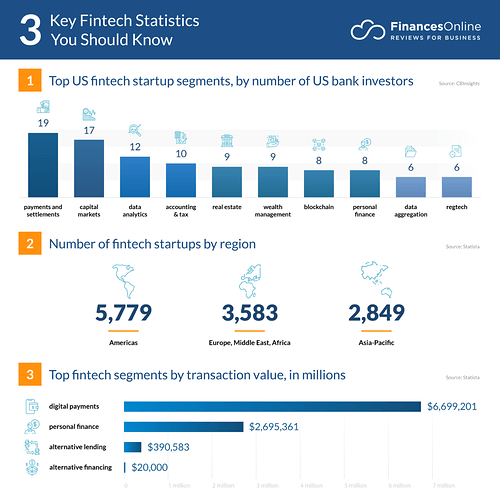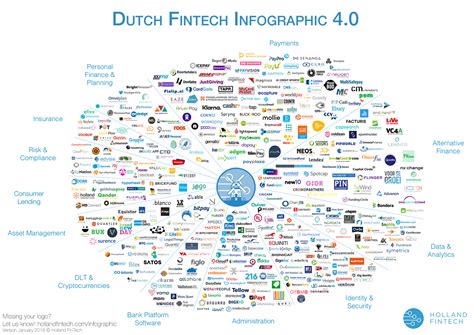Assignment – Introduction to Fintech
- Use google to find fintechs that are active in your region. Try to find at least one for each of the 6 pillars of finance and write a couple of sentences on what each and one of the fintechs are doing and share your answer in the forum if you like
PAY: BRAINTREE
Industry: Payments
Location: Chicago, Illinois
What it does: A division of PayPal, provides payment services to businesses of all sizes. Accepting payment types ranging from credit cards to Venmo, its products help companies that operate online and as marketplaces to bolster security, prevent fraud and safeguard user information.
PAY: VENMO
Location: New York, Chicago
What it does: Venmo makes it simple to exchange money between
friends or even accept payments as a business. Going out to dinner
with a friend and don’t want to split the bill with credit cards or cash?
Maybe you want to pay your dog walker with something other than a
check? Venmo’s app makes it easy to transfer money from your bank
account into another users, so you can keep track of payments in realtime.
PAY: GRAVITY PAYMENTS
Industry: Payments
Location: Seattle
What it does: Gravity Payments is a payment processing platform for
small businesses that features lower rates and flexible processing
solutions. The company’s platform streamlines financial transaction
processing for everything from credit cards to POS systems and even
gift cards.
INVEST: COINBASE
Industry: Blockchain, Bitcoin
Location: San Francisco, California
What it does: Coinbase is an online platform for buying, selling and
managing digital currency that provides users with secure mobile
access to their digital assets. Coinbase supports 32 countries and has
exchanged more than $150 billion in various forms of digital currency,
including Bitcoin, Bitcoin Cash, Ethereum and Litecoin.
INVEST: ROBINHOOD
Industry: Stocks
Location: Menlo Park, California
What it does: Robinhood is an investment application that allows
users to invest for free from a desktop or mobile device. Because there
are no physical locations or individual account management services,
Robinhood aims to make investing accessible to would-be traders who
can’t quite swing the fees of a traditional brokerage house
BORROW: BLEND
Industry: Consumer Lending
Location: San Francisco
What it does: Blend’s digital lending platform simplixes the loan
process and gives consumers a more transparent look into their
xnances. The platform combines low-touch pre-approval processes
with quick data verixcation tools to create a software that automates
and expedites the lending process for everything from mortgages to
car loans. Blend provides major xnancial institutions, like Wells Fargo,
US Bank, and BMO Harris, with the tools they need to process billions
of dollars of loans each day.
BORROW: AVANT
Industry: Lending
Location: Chicago, Illinois
What it does: Avant is a loan service for middle-income consumers
that offers loans ranging from $2,000-$35,000. The service operates
largely as a resource for customers to access funds for things like
consolidating debt or paying unexpected bills. Avant requires only a
simple application and approves loans in as little as one day.
SAVE: AVANT
Industry: Banking
Location: San Francisco
What it does: Varo Money is a digital consumer bank using its digital
app and other fintech tools to help users get a more complete look
into their finances. The digital-first company offers both checking and
savings accounts, which can be accessed through their fully
transparent app. The app gives users insights into spending habits and
even allows for instant money transfers. There isn’t a minimum
balance required to receive a Varo debit card, and there are zero fees
for overdrafts, foreign transactions or transfers.
SAVE: CHIME
Industry: Banking
Location: San Francisco, California
What it does: Chime is a pioneering mobile bank that offers no-fee
and automatic savings accounts as well as early payday via direct
deposit. With over one million opened accounts, Chime is reportedly
one of the fastest growing banks in the United States
LEND: MyConstant
Industry: Experience multi-market peer-to-peer lending.
Location: California, Vietnam, Malta, and Hong Kong
Invest in people and businesses around the world for up to 11% APR. All lending is backed by borrower collateral or buy-back guarantee. Earn across multiple markets, spreading risk and maximizing reward.
Or, borrow against 73+ cryptocurrencies to get the cash you need, instantly. Your crypto is securely held until you repay. Unlock the value of your crypto without selling it.
While not on loan or waiting for a match, your funds earn an automatic 4% APY, and you can withdraw anytime for free. So no downtime, no wasted earnings.
LEND: Aave
The Aave lending protocol has a feature called Credit Delegation. It allows you to lend a range of cryptocurrencies at both fixed and variable interest rates.
This system makes loan terms more flexible between the lender and the borrower but increases the risk of the investment. The returns vary depending on the type of cryptocurrency invested but can range anywhere from 0% to 16%.
INSURE: Lemonade
(NYSE:LMND)
Lemonade’s competitive advantage
Lemonade was built for a digital world, using big data and artificial intelligence to make its business more efficient. On the backend, Lemonade uses AI to manage workflow and predict fraud. And on the frontend, the company uses AI chatbots to interact with customers, underwrite policies, and pay claims . This allows Lemonade to provide a high-quality user experience at a lower cost than traditional insurers. For example, Lemonade estimates that its competitors employ one person per 150-450 customers, but Lemonade only employs one person per 2,000 customers . This type of efficiency reduces operating expenses and gives Lemonade an edge over its rivals.
Lemonade also collects more customer data than its rivals. For example, to purchase insurance, customers interact t with AI Maya, a chatbot who typically asks them 13 questions. During this quick process, Lemonade’s platform gathers 1,700 data points. In comparison, typical insurance companies gather 20-50 data points per policy.
INSURE: States Title
States Title is joining a handful of startups including OneTitle and Spruce that are using technology to search records quicker and without agents. That enables them to undercut the traditional players saving homeowners and mortgage companies time and money.



 Great work!
Great work!